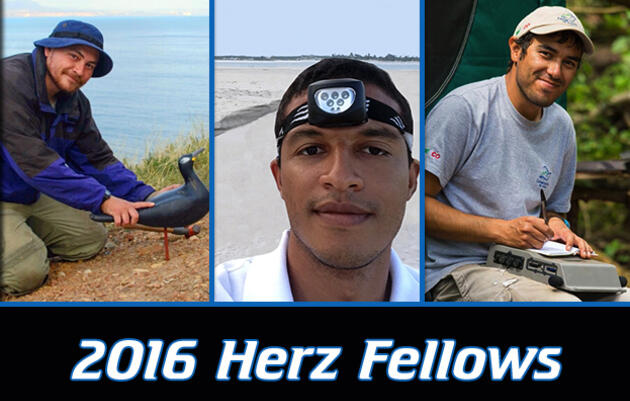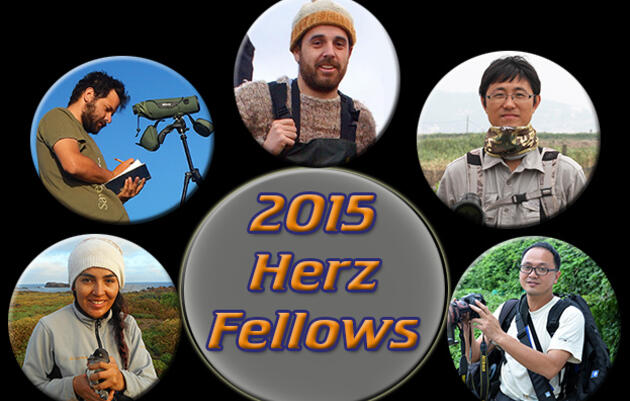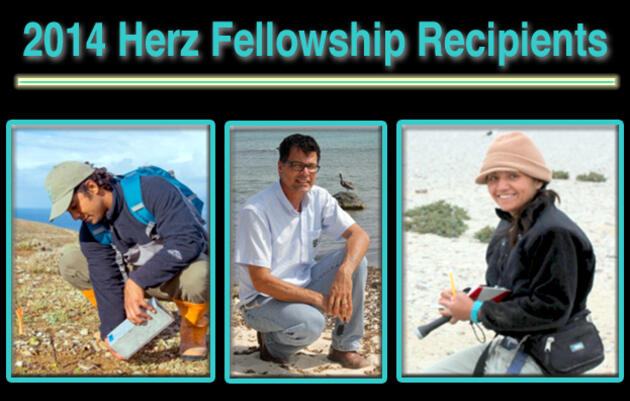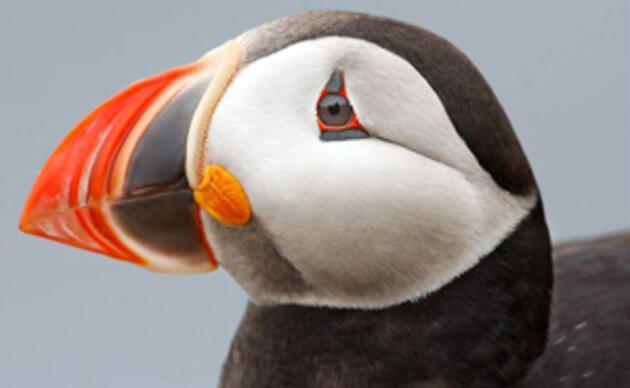Herz International Seabird Fellowship
The Seabird Institute (formerly Seabird Restoration Program) of the National Audubon Society is an internationally recognized program that restores seabirds to historic nesting islands through the use of innovative techniques based on seabird behavior and ecology. For 50 years, the program has restored populations of rare and endangered seabirds to islands in the Gulf of Maine using techniques such as models, mirrors, sound recordings, translocation of young seabirds and habitat management. These techniques have great potential to help rare species, as nearly all seabirds share biological traits such as colonial nesting habits, tendencies to return to hatching places and attraction to others of their species by sight and sound. Techniques developed at Audubon's Maine Coast Seabird Sanctuaries have helped rare seabirds in the Galapagos Islands, Hawaiian Islands, Japan, New Zealand, California and Washington where seabirds were decimated due to human actions.
Need
Many of earth's 346 seabird species could benefit from SRP techniques since the ranges and populations of most species are greatly decreased compared to historic periods, especially in areas where human activities have reduced habitat, introduced predators and polluted coastal waters. Birdlife International presently lists 28% of all seabirds as globally threatened. Some seabird groups such as the petrels and shearwaters are especially threatened with nearly half of all species on the globally threatened list. The need for proactive conservation strategies is urgent, as some species nest at just one location where disease and predators could easily eliminate entire species. Many of these species could benefit from techniques piloted and proven in the Gulf of Maine, but there is presently no systematic strategy for disseminating information to other biologists and wildlife managers beyond publications and presentations at scientific meetings.
Most of the rare seabirds of the world live in tropical climates where the resource agencies of third world countries have very limited funding for managing seabirds and are unlikely to send their biologists outside of the country for training programs that could offer models and techniques for helping rare birds.
Fellowship
The Josephine D. Herz Seabird Fellowship Fund will provide travel and living expenses for resource managers to attend Audubon's Seabird Management Internship at the Society's Maine Coastal Island Sanctuaries during the period of late May to mid-August. (To view past recipients, please scroll to the bottom of this page.)
Training program
The Seabird Institute's training program is a 10-week field practicum for college students and professionals interested in learning applied seabird management techniques. The program builds on knowledge from several theoretical disciplines, principally evolutionary biology, taxonomy, genetics, oceanography, marine biology and marine ornithology. The program combines theory with practical experience from applied disciplines such as wildlife management and aviculture to develop proactive techniques for managing rare and endangered seabirds.
Recipients of the Josephine D. Herz Fellowship will begin their internship at Audubon's Hog Island Environmental Education Center (Bremen, Maine USA ) in late May where they will take part in an intensive two-day orientation program with approximately twenty summer interns actively managing seabird nesting islands throughout the Gulf of Maine. Instructors for the training program include biologists from Audubon's SRP and U.S. Fish and Wildlife Service as well as faculty from cooperating universities including the University of Maine and University of New Brunswick. The training program focuses on the following topics:
|
After orientation training, the fellowship recipient will begin the field practicum part of the program. This will take place on Audubon's system of managed seabird nesting islands. There are seven field stations located on islands along the Maine coast. Some islands such as Eastern Egg Rock have been managed for over 30 years, while the most recent project on Outer Green Island was started in 2002. The islands range in size from 2 ha Jenny Island to 50 ha Seal Island National Wildlife Refuge. The islands are largely treeless and remote, some located as much as 30 km offshore. See the map of research islands for detailed descriptions of the research stations, field projects conducted at each island and lists of species nesting on the islands.
The Herz Fellows will join an island team comprised of 2-4 other biologists where they will receive supervision and additional training from a resident Island Supervisor as well as other science staff. Recipients will visit multiple islands over the course of the summer and participate in various restoration projects - some just starting and others that are 30-year success stories. Where interest exists, there may also be opportunities for fellows to participate in ongoing education and outreach programs.
Eligibility
Applicants should hold the position of biologist or similar on the staff of a conservation agency, academic or research institution or non-governmental organization concerned with seabird conservation. Applicants with a specific conservation project concerning a rare or endangered seabird are especially encouraged to apply. If you are interested in the Herz International Seabird Fellowship, please contact us to learn more and apply.
Assistance for initiating international conservation projects.
The Seabird Institute will assist Herz Fellows establish new seabird conservation programs within the Fellow's home country. By demonstrating international interest in the conservation of seabirds in third world countries, Audubon can help Herz Fellows to build support for developing and implementing conservation programs.
Participating SRP staff
|
Dr. Don Lyons , Director of Conservation Science, joined Audubon in 2018 and now leads seabird research and stewardship efforts at our sanctuary network of seven seabird nesting islands in Maine as well as contributing to conservation and research projects elsewhere. He has worked on seabird ecology and conservation for over 20 years from the North Atlantic in Maine to the South Pacific in Indonesia, and provided leadership on projects of great conservation relevance such as colony restoration for the critically endangered Chinese Crested Tern in Asia, investigations of the steep decline of Aleutian Terns in Alaska, and reduction of conflicts between Caspian Terns and threatened salmon populations in the Pacific Northwest. His current efforts include expanding the use of seabird diet and reproductive performance to inform fisheries management, assessing the impacts of our warming climate on marine ecosystems, and the restoration of vulnerable tern and alcid populations. Don also serves as an instructor at the Hog Island Audubon Camp and Oregon State University where he holds an Assistant Professor (Research) appointment in the Department of Fisheries, Wildlife, and Conservation Sciences. He has taught courses on seabird ecology and conservation, physiology of marine megafauna, and natural resource management, and regularly advises graduate students. |
|
|
Paula Shannon is the Seabird Sanctuary Manager for the National Audubon Society's Seabird Restoration Program (SRP). She began working for SRP in 2002, as Island Supervisor on Matinicus Rock, Maine's most diverse seabird colony. She continued in this role for five years until 2006, participating in various projects involving alcids, terns, gulls, storm-petrels, and shearwaters. In 2011 she returned to SRP, supervising the research and management of all seven of SRP’s field stations. She has also studied seabirds in Alaska and Hawaii, leading fieldwork on seabirds for the US Fish and Wildlife Service in Alaska's Pribilof and Semidi Islands from 2008-2010, and serving as a biologist in the French Frigate Shoals in the Northwest Hawaiian Islands. Paula also worked for the Bureau of Land Management in Oregon, with much of her work focused on Marbled Murrelets. In addition to her work with seabirds, Paula has worked on numerous avian research and conservation projects across the United States, including work with raptors, songbirds, and shorebirds. She holds a Bachelor's degree in Biology from Bowdoin College in Brunswick, Maine, which is where she first developed a love and appreciation for the Maine coast. |
Past Herz Fellowship recipients have included:
- Alcides Morales Pérez
- Alejandra Fabila (2014)
- Alejandro Aguilar Vargas (2017)
- Alfonso Hernandez-Rios (2015)
- Alicia Aztorga Ornelas (2017)
- Ana Gabriel Cárdenas (2018)
- Andreinna Morán Alvarez (2019)
- Anely Fernández Robledo (2019)
- Ángel Méndez (2019)
- Ariana Duarte Canizales (2018)
- Arminda Mejia Rebollo
- Carlos Zavalaga
- Esmerelda Bravo (2015)
- Facundo Franken (2014)
- Fan Zhongyong (2015)
- Fernando Solis (2016)
- Jonathan dos Santos (2016)
- Jorge Valenzuela (2015)
- Lu Yiwei (2015)
- Lyanne Pierina Ampuero Merino (2018)
- María Félix Lizarraga
- María José (Coté) (2018)
- Marlenne Adriana Rodríguez
- Miguel Corrales (2016)
- Sia Rasalato
- Silvestre Montesinos (2014)
- Siyu Wang (2019)
- Talía Pérez Martínez
- Yuliana Bedolla Guzmán (2017)
Related
2016 Josephine Daneman Herz International Seabird Fellows
In 2016 there were three Seabird Fellows
2015 Josephine Daneman Herz International Seabird Fellows
In 2015 there were five Seabird Fellows
2014 Josephine Daneman Herz International Seabird Fellows
In 2014, there were three Seabird Fellows
Learn about birds and take action
Adopt-A-Puffin
Adopt now and receive a Certificate of Adoption, along with a biography of "your" puffin!
Visitor Center
The Project Puffin Visitor Center (PPVC) is located at 311 Main Street in downtown Rockland, Maine. The center opened its doors officially on July 1, 2006.






